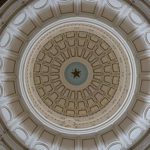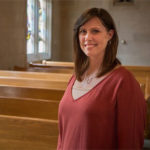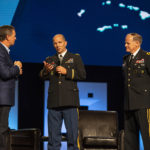KILLEEN (BP)—Nothing prepared Army Chaplain Jason Palmer for his initial tour of the yellow-taped crime scene at Fort Hood’s Soldier Readiness Center, where he saw trails of blood still on the floor, bloody handprints on the walls and the telephone pole outside where the alleged shooter collapsed to the ground after being shot four times in the abdomen.
Army personnel still were cleaning up the site 48 hours after a mass shooting that claimed the lives of 13 soldiers—one of them a pregnant woman—and left 29 others wounded, Palmer said.

Chaplain Jason Palmer
|
Some of the shooting victims were preparing to deploy to Afghanistan or Iraq within two weeks. They were at the center—a large administrative clearinghouse—on Nov. 5 to update personnel records related to next-of-kin notification, life insurance, medical and dental records, and legal matters. Some were there to get immunizations or blood work.
“People were stacked up in there like cordwood,” Palmer said. “There were rows and rows of chairs and lines of people snaking through the facility. The service people there were sitting ducks when the shooter came into the room.”
Palmer, 33, was on duty at his home base, Fort Riley in Manhattan, Kan., when he and a fellow chaplain there were ordered to report immediately to Fort Hood. Additional chaplains also were deployed from Fort Lewis in Washington state and Fort Carson in Colorado Springs, Colo.
Working a minimum of 12 hours a day since the shooting, Palmer, a chaplain endorsed by the Southern Baptist North American Mission Board, said counseling for the grieving and traumatized ramped up Nov. 9, the first workday back for most of the more than 50,000 officers and enlisted men and women at Fort Hood. Most Fort Hood personnel were given the day off the previous Friday because of the incident.
“I personally counseled nine people on Monday, including people who were present at the shooting scene as well as people who carried bodies out of the building and saw them covered with white sheets. We’re engaging people as fast as they walk in, but we’re getting busier because the families of the deceased are starting to arrive.
“The soldiers are grieving about the loss they’ve seen with their own eyes,” Palmer said. “Some of them had seen loss while deployed in Iraq or Afghanistan, but Fort Hood is supposed to be a safe place, their home. They see this incident as wrong on so many levels. There’s a lot of anger.”
Sign up for our weekly edition and get all our headlines in your inbox on Thursdays
Palmer said the victims he is counseling ask questions like “How can I feel safe again in the United States in my own home, my own backyard?”
“That’s where my counseling begins,” Palmer said. “My job is to contextualize the theological issues of evil and to provide these people with hope that transcends the hurt they’re now undergoing.”
Palmer, along with more than 50 other military chaplains—not only the 12 Southern Baptist chaplains at Fort Hood but those of several other de-nominations, and including Muslim and Jewish chaplains—are counseling people from the 18 different Army units at the base impacted by the shooting.
“Many are coming in and saying, ‘I haven’t eaten or slept since the incident. I was there, saw this and did that.’
“Some come in with that seasoned, veteran look and the thousand-yard stare but once they’re in a private setting where they can be safe and vulnerable, tears stream out of their eyes,” Palmer said. “They relive stories and recount memories and dreams they can’t get out of their heads. Some are reliving the shooting in their dreams and see and hear the victims calling out for help, but they can’t help.”
Palmer said his orders originally called for him to be assigned at Fort Hood for two weeks.
“It could be longer,” he said.














We seek to connect God’s story and God’s people around the world. To learn more about God’s story, click here.
Send comments and feedback to Eric Black, our editor. For comments to be published, please specify “letter to the editor.” Maximum length for publication is 300 words.